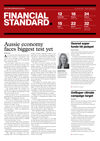TNFD guides board directors on assessing nature-related risksBY JAMIE WILLIAMSON | WEDNESDAY, 7 MAY 2025 11:00AMThe Taskforce on Nature-related Financial Disclosures (TNFD) published its first Asking Better Questions on Nature guide to assist senior executives with appropriately assessing nature-related dependencies, impacts, risks and opportunities. The first guide, released this week, is for board directors. Further guides for different audiences will be released over the next year. The guide is produced in collaboration with Chapter Zero, Competent Boards, Commonwealth Climate and Law Initiative (CCLI) and Green Finance Institute (GFI). It is designed to give board members the information they need to ensure that nature-related issues are being appropriately considered during decision making and integrated with companies' governance, strategy, risk management and capital allocation practices. It follows a GFI report last year that demonstrated nature risks could decrease the UK's GDP by up to 12% by the 2030s. The aim is for companies to strengthen resilience and unlock commercial opportunities. In essence, the guide presents 12 key questions that directors should be asking company executives and considering in board meetings. It also includes examples of analysis they should expect to see from organisations when considering such matters, the TNFD said. The recommended questions include:
The 12 questions have been identified by the TNFD and its partner organisations based on discussions with companies already considering climate- and nature-related issues, it added. Commenting on the guide's release, Competent Boards chief executive Helle Bank Jorgensen said no business is immune to nature risk. "We are proud to collaborate with the TNFD on this guide, which equips directors with the critical questions needed to safeguard long-term value in a world where the health of nature and the resilience of business are inseparable," she said. "This is a timely and practical resource to help boards fulfill their duty of care and engage confidently with stakeholders on nature-related issues." While many boardrooms have given focus to climate, they often don't see nature and climate as intrinsically linked in the way that they should be, Chapter Zero chief executive Vicky Moffatt said. "The nature question comes into sharpest focus for risk committees given that we are pushing our planet beyond its boundaries. From this perspective oversight for the reliance and impacts on nature should be central to the question of organisational resilience," she said. "This guide enables non-executive directors, boards and their management teams to ask all the right questions to ensure this oversight is in place." Agreeing, Commonwealth Climate and Law Initiative lawyer Jasmin Fraser said directors' legal duties of care compel them to manage nature-related risks. "While management may be closer to the detail, this is no excuse for boards to remain at arm's length. Directors need to ask the right questions, challenge assumptions, and ensure action is taken where needed," she said. "This guide is an essential tool for boards to engage meaningfully with nature-related risks and opportunities, providing strategic insight to create value and strengthen company resilience." More than 500 organisations representing over US$17 trillion in assets are now underway with voluntary assessment and reporting of their nature related issues aligned to the TNFD recommendations, made in September 2023. TNFD chief executive Tony Goldner said: "With data and analysis now being generated, it is critical that boards and individual board members upskill themselves to be able to contextualise nature-related information as a key input into their decision making." "This guide is grounded in insights and wisdom from experienced board directors already taking an integrated approach to climate and nature issues." Related News |

Santos has received a non-binding $8.89 per share cash offer from the XRG Consortium, led by XRG P.J.S.C., a subsidiary of Abu Dhabi National Oil Company (ANDOC), alongside Abu Dhabi's sovereign wealth fund ADQ and US private equity firm Carlyle.
The best-functioning boards are future thinkers, understand their ESG responsibilities and are able to show their "battle scars," according to two governance experts.
While funding for impact startups has broadly declined, those operating in climate, health and people has seen funding levels improve compared to three years ago, according to the Impact Startups Benchmark Report 2025.
Investors have a significant role to play in helping to move the dial on executive remuneration, aiming to increase fairness and reduce inequality.
















